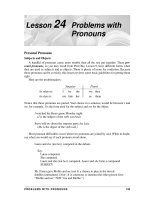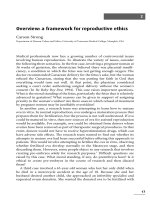Indefinite pronouns overview
Bạn đang xem bản rút gọn của tài liệu. Xem và tải ngay bản đầy đủ của tài liệu tại đây (14.57 KB, 1 trang )
Indefinite pronouns overview
Indefinite pronouns are used to talk about people or things in general. They don’t refer to any particular person.
Examples are: all, none, any, some, one, someone, no one, nobody, somebody etc.
Study the sentences given below.
One does not know what to do in such situations.
One must be content with one’s lot.
One cannot choose one’s parents.
One must not boast of one’s achievements.
One must put one’s best foot forward.
One must not lose hope no matter what happens.
None of these stories are worth reading.
They say he has lost his marbles. (To lose one’s marbles is to go crazy.)
None of them are here right now.
All were drowned.
Some are born great; some achieve greatness; some have greatness thrust upon them.
Somebody has stolen my phone.
Nobody was there to save the child from drowning.
Few escaped unhurt.
We didn’t see any of them again.
Most of these words can also be used as adjectives. Note that when they are used as adjectives, they are
followed by a noun.
Few people escaped unhurt.
Some people are born great.
The pronoun he or she is used to refer to the indefinite pronouns anybody, everybody, anyone, everyone and
each.
Every one of the boys has submitted his work.
When the sex is not mentioned, the third person plural pronoun ‘they’ is used to refer to anybody, everybody etc.
Everybody likes to have their way.
Stay on top of your writing! Download our grammar guide from www.englishgrammar.org to stay up-to-date.
Powered by TCPDF (www.tcpdf.org)









